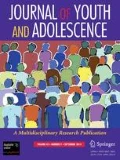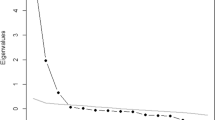Abstract
This study was desgined to examine gender differences in identity formation in late adolescents from divorced mother-custody families. Fifty-seven female and thirty-nine male college students ranging in age from 17 to 25 years completed the Child's Report of Parental Behavior [E. S. Schaeffer (1965) “Children's Reports of Parental Behavior: An Inventory,” Child Development, Vol. 36, pp. 412–482] and were interviewed using the J. E. Marcia [(1966) “Development and Validation of Ego Identity Status,” Journal of Personality and Social Psychology, Vol. 3, pp. 551–558] semistructured Identity Status Interview. While no differences between males and females were found in ratings of overall identity status, significantly more females were in the achieved category within the domains of occupation and attitudes toward premarital sex. Also, males perceived their mothers as significantly more accepting and less controlling than did females. The absence of the father and the altered role of the mother appear to have a differential impact on males and females who have grown up in mother-custody families. Implications of these and other findings are discussed.
Similar content being viewed by others
References
Archer, S. (1985). Identity and the choice of social roles. In Waterman, A. S. (ed.),Identity in Adolescence: Processes and Contents. Jossey-Bass, San Francisco.
Barber, B. L. (1987, April). Family structure effects: Importance and assessment. Paper presented at the biennial meeting of the Society for Research on Child Development, Baltimore, MD.
Barber, B. L., and Eccles, J. S. (1991 April). Divorce and remarriage effects on mathematics performance: Maternal expectations mediate decline. Paper presented at the biennial meeting of the Society for Research on Child Development, Seattle, WA.
Bourne, E. (1978a). The state of research on ego identity: A review and appraisal. Part I.J. Youth Adolesc. 7: 223–252.
Bourne, E. (1978b). The state of research on ego identity: A review and appraisal. Part I.J. Youth Adolesc. 7: 371–392.
Bronfenbrenner, U. (1961). In Petrullo, L., and Bass, B. M. (eds.),Leadership and Interpersonal Behavior. Holt, Rinehart & Winston, New York.
Camara, K. A., and Resnick, G. (1988). Interparental conflict and cooperation: Factors moderating children's post-divorce adjustment. In Hetherington, E. M., and Arasteh, J. D. (eds.),Impact of Divorce, Single Parenting, and Stepparenting on Children. Erlbaum, Hillsdale, NJ:
Covell, K., and Turnbulll, W. (1982). The long-term effects of father absence in childhood on male university students' sex-role identity and personal adjustment.J. Genet. Psychol. 141: 271–276.
Dornbusch, S. M., Carlsmith, J. M., Bushwall, S. J., Ritter, P. L., Leiderman, H., Hastorf, A. H., and Gross, R. T. (1985). Single parents, extended households, and the control of adolescents.Child Develop. 56: 326–341.
Douvan, R., and Adelson, J. (1966).The Adolescent Experience. Wiley, New York.
Emery, R. E. (1988).Marriage, Divorce and Children's Adjustment. Sage, Beverly Hill, CA.
Erickson, E. H. (1963).Childhood and Society (2nd ed.). Norton, New York.
Erickson, E. H. (1968).Identity, Youth and Crisis. Norton, New York.
Fauber, R., Forehand, R., Thomas, A. M., and Wierson, M. (1990). A mediational model of the impact of marital conflict on adolescent adjustment in intact and divorced families: The role of disrupted parenting.Child Develop. 61: 1112–1123.
Forehand, R., Thomas, A. M., Wierson, M., Brody, G., and Fauber, R. (1990). Role of maternal functioning and parenting skills in adolescent functioning following parental divorce.J. Abnorm. Psychol. 99: 278–283.
Glenn, N. D. (1985, June). Children of divorce.Psychol Today pp. 68–69.
Grossman, S. M., Shea, J. A., and Adams, G. R. (1980). Effects of parental divorce during early childhood on ego development and identity formation of college students.J. Divorce 3: 263–272.
Guidubaldi, J., and Perry, J. D. (1985). Divorce and mental health sequelae for children: A two-year follow-up of a nationwide sample.Am. Acad. Child Psychiat. 24: 531–537.
Hetherington, E. M. (1989). Coping with family transitions: Winners, losers, and survivors.Child Develop. 60: 1–14.
Hetherington, E. M., Cox, M., and Cox, R. (1985). Long-term effects of divorce and remarriage on the adjustment of children.J. Am. Acad. Child Psychiat. 24: 518–530.
Hetherington, E. M., Cox, M., and Cox, R. (1978). The aftermath of divorce. In Stevens, J. H., Jr., and Matthews, M. (eds.),Mother-Child, Father-Child Relations. National Association for the Education of Young Children, Washington, DC.
Hetherington, E. M., Cox, M., and Cox, R. (1976). Divorced fathers.The Family Coordinator 25: 417–428.
Hodgson, J. W., and Fischer, J. L. (1979). Sex differences in identity and intimacy development in college youth.J. Youth Adolesc. 8: 37–50.
Jordan, D. (1971). Parental antecedents and personality characteristics of ego identity statuses. Unpublished doctoral dissertation, State University of New York, Buffalo.
Kalter, N. (1987). Long-term effects of divorce on children: A developmental vulnerability model.Am. J. Orthopsychiat. 57: 587–600.
Kalter, N., Riemer, B., Brickman, A., and Chen, J. W. (1985). Implications of parental divorce for female development.J. Am. Acad. Child Psychiat. 24: 538–544.
Kulka, R. A., and Weingarten, H. (1979). The long-term effects of parental divorce in childhood on adult adjustment.J. Social Issues 35: 50–78.
La Voie, J. C. (1976). Ego identity formation in middle adolescence.J. Youth Adolesc. 5: 371–385.
Marcia, J. E. (1966). Development and validation of ego identity status.J. Personal. Social Psychol. 3: 551–558.
Marcia, J. E. (1980). Identity in adolescence. In Adelson, J. (ed.),Handbook of Adolescent Psychology. Wiley, New York.
Matteson, D. E. (1977). Exploration and commitment: Sex differences and methodological problems in the use of the identity status categories.J. Youth Adolesc. 6: 353–374.
McClanahan, S. S., Astone, N. M., and Marks, N. (1988, June). The role of mother-only families in reproducing poverty. Paper presented at the Conference on Poverty and Children, Lawrence, KS.
Morrow, W. R., and Wilson, R. C. (1961). Family relations of bright high achieving and under-achieving high school boys.Child Develop. 32: 501–510.
Morse, B. (1973). Identity status in college women in relation to perceived parent-child relationships. Unpublished doctoral dissertation, The Ohio State University.
Oshman, H. P., and Manosovitz, M. (1976). Father absence: Effects of stepfathers upon psychosocial development in males.Develop. Psychol. 12: 479–480.
Peterson, J. L., and Zill, N. (1990). Marital disruption, parent-child relationships, and behavior problems in children.J. Marriage Family 48: 295–307.
St. Clair, S., and Day, H. D. (1979). Ego identity status and values among high school females.J. Youth Adolesc. 8: 317–326.
Santrock, J., and Warshak, R. A. (1986). Development of father custody relationships and legal/clinical considerations in father-custody families. In Lamb, M. E. (ed.),The Father's Role: Applied Perspectives. Wiley, New York.
Santrock, J., and Warshak, R. A. (1979). Father custody and social development in boys and girls.J. Social Issues 35: 112–125.
Schaeffer, E. S. (1965). Children's reports of parental behavior: An inventory.Child Develop. 36: 412–482.
Schenkel, S., and Marcia, J. E. (1972). Attitudes toward premarital intercourse in determining ego identity status in college women.Personal. 3: 472–482.
Schwarz, J. C., Barton-Henry, M. L., and Pruzinsky, T. (1985). Assessing child-rearing behaviors: A comparison of ratings made by mother, father, child, and sibling on the CRPBI.Child Develop. 56: 462–479.
Serot, N. M., and Teevan, R. C. (1961). Perception of the parent-child relationship and its relation to child adjustment.Child Develop. 32: 373–378.
Thorbecke, W., and Grotevant, H. D. (1982). Gender differences in adolescent interpersonal identity formation.J. Youth Adolesc. 11: 479–491.
Wallerstein, J. S. (1985). Children of divorce: preliminary report of a ten-year follow-up of older children and adolescents.J. Am. Acad. Child Psychiatr. 24: 545–553.
Waterman, A. S. (1985).Identity in Adolescence: Processes and Contents. Jossey-Bass, San Francisco.
Waterman, A. S., and Nevid, J. S. (1977). Sex differences in the resolution of the identity crisis.J. Youth Adolesc. 6: 337–342.
Zaslow, M. J. (1989). Sex differences in children's response to parental divorce: 2. Samples, variables, ages, and sources.Am. J. Orthopsychiat. 59: 118–141.
Zill, N. (1988). Behavior, achievement, and health problems among children in stepfamilies: Finding from a national survey of child health. In Hetherington, E. M., and Arasteh, J. D. (eds.),Impact of Divorce, Single-Parenting and Stepparenting on Children. Erlbaum, Hillsdale, NJ.
Author information
Authors and Affiliations
Additional information
Received Ph.D. in Counseling Psychology from Teachers College Columbia University. Research interests include adolescent identity formation, the intersection and integration of personal and career counseling, and career development.
Rights and permissions
About this article
Cite this article
Imbimbo, P.V. Sex differences in the identity formation of college students from divorced families. J Youth Adolescence 24, 745–761 (1995). https://doi.org/10.1007/BF01536955
Received:
Accepted:
Issue Date:
DOI: https://doi.org/10.1007/BF01536955




